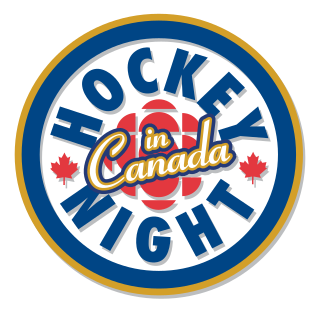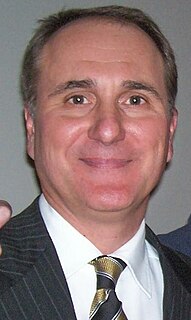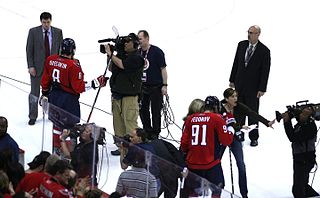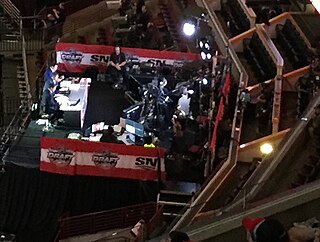
CBC Television has aired National Hockey League (NHL) broadcasts under the Hockey Night in Canada brand that is primarily associated with its Saturday night NHL broadcasts throughout its history in various platforms.
The NHL on CBS is the branding used for broadcasts of National Hockey League (NHL) games produced by CBS Sports and televised on CBS in the United States.
NHL on CTV is the name of a former television program that broadcast National Hockey League games on the CTV Television Network.
CTV Sports was the division of the CTV Television Network responsible for sports broadcasting. The division existed in its own right from 1961 to 2001; between 1998 and 2001, CTV Sports also operated a cable sports network, CTV Sportsnet, now owned by Rogers Media and known simply as Sportsnet.

Chris Cuthbert is a Canadian sportscaster. He is the lead play-by-play commentator for NHL on Sportsnet and Hockey Night in Canada, since 2021. Formerly, he worked for TSN, NBC, and CBC Sports in a multitude of roles.
NHL on RKO General relates to a small, syndicated network of stations owned by RKO General which broadcast National Hockey League games.
The National Hockey League has never fared as well on American television in comparison to the National Basketball Association, Major League Baseball, or the National Football League, although that has begun to change, with NBC's broadcasts of the final games of the 2009, 2010, 2011, and 2013 Stanley Cup Finals scoring some of the best ratings ever enjoyed by the sport on American television.
As of the 2022 NFL season, CTV and TSN broadcast Sunday and Monday games and Amazon Prime Video streams Thursday games. TSN and CTV 2 own rights to Sunday Night Football and Monday Night Football. Amazon Prime Video owns rights to Thursday Night Football. RDS carries games in the French language from all timeslots. U.S. network television feeds may also be available, often from multiple markets, on cable and satellite ; all games are subject to simultaneous substitution.

The National Hockey League (NHL) is shown on national television in the United States and Canada. With 25 teams in the U.S. and 7 in Canada, the NHL is the only one of the four major professional sports leagues in the United States and Canada that maintains separate national broadcasters in each country, each producing separate telecasts of a slate of regular season games, playoff games, and the Stanley Cup Finals.
From 1965 through 1975, in addition to the Saturday night game on CBC, Hockey Night in Canada also produced and broadcast a Wednesday night game on CTV, CBC's privately owned competitor; beginning in the 1975–76 NHL season, these midweek games would begin to be broadcast by local stations.
From 1965 through 1975, in addition to the Saturday night game on CBC, Hockey Night in Canada also produced and broadcast a Wednesday night game on CTV, CBC's privately owned competitor; beginning in the 1975–76 NHL season, these midweek games would begin to be broadcast by local stations. In 1970–71, the Vancouver Canucks joined the NHL, meaning that there were now three possible venues for an HNIC telecast.
During the 1979–80 and 1980–81 seasons, four more Canadian teams, the Edmonton Oilers, Quebec Nordiques, Winnipeg Jets, and Calgary Flames, joined the NHL. The Oilers and Flames were featured frequently as the two teams were contenders the 1980s; in contrast, as the Nordiques were owned by Carling-O'Keefe, a rival to the show's sponsor Molson and whose English-speaking fanbase was very small, the Nords were rarely broadcast, and never from Quebec City during the regular-season.
After Wayne Gretzky was traded to the Los Angeles Kings in 1988, CBC began showing occasional double-headers when Canadian teams visited Los Angeles to showcase the sport's most popular player. These games were often joined in progress, as the regular start time for Hockey Night in Canada was still 8 p.m. Eastern Time and the Kings home games began at 7:30 p.m. Pacific Time. Beginning in the 1995 season, weekly double-headers became permanent, with games starting at 7:30 Eastern and 7:30 Pacific, respectively. In 1998, the start times were moved ahead to 7 p.m. ET and PT.
Since 2000, the CBC has aired an annual special Hockey Day in Canada broadcast to celebrate the game in Canada. The broadcast includes hockey-related features all afternoon, leading up to a tripleheader of NHL action featuring the seven Canadian teams. One exception was the 2008 edition that featured four games including two American teams along with the six Canadian teams; this was due to the NHL's schedule format at the time, as there was no inter-conference games between Canadian teams. Lead commentators, Don Cherry and Ron MacLean broadcast from a remote area. The broadcast includes live broadcast segments from smaller communities right across the country and features panel discussions on issues facing "Canada's game" at both the minor and pro levels. The day is usually in mid-February, but was broadcast in early January in 2002 and 2006 due to the 2002 Winter Olympics and 2006 Winter Olympics, respectively; the 2007 event was also held in January, though no sporting events key to Canada were scheduled.

On April 19, 2011, after ESPN, Turner Sports, and Fox Sports placed bids, NBC Sports announced it had reached a ten-year extension to its U.S. television contract with the NHL worth nearly $2 billion over the tenure of the contract. The contract would cover games on both NBC and sister cable channel Versus, which became part of the NBC Sports family as the result of Versus parent Comcast's controlling purchase of NBC Universal earlier in 2011.



